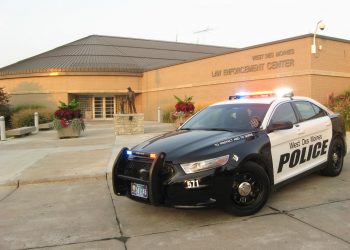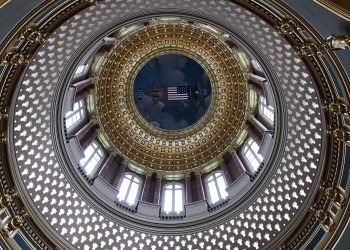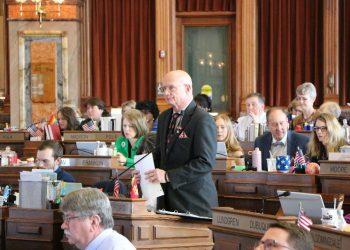DES MOINES, Iowa – On Wednesday afternoon, an Iowa House subcommittee advances HSB 64, a bill that prohibits school districts from using voluntary diversity plans to deny students from open enrollment.
State Reps. Dennis Hite, R-New Sharon, and John Wills, R-Spirit Lake, supported the bill. State Rep. RasTafari Smith, D-Waterloo, opposed the bill.
Open enrollment is a cost-free option by which parents/guardians residing in an Iowa district may enroll their children into another Iowa school district. The resident school district and receiving school district have to approve the request.
School districts with voluntary diversity plans under Iowa law can deny open enrollment requests for families that do not qualify for free or reduced school lunches. Currently, a family of four whose household income exceeds $49,025 would not be eligible.
Des Moines, Davenport, Postville, Waterloo, and West Liberty are the only five school districts in Iowa that use voluntary diversity plans.
Removing this potential hurdle was a priority Gov. Kim Reynolds shared in her Condition of the State address last week.
Several lobbyists representing public schools spoke out against the bill.
Emily Piper representing the Iowa Association of School Boards, said there are legitimate reasons these five school districts utilize voluntary diversity plans.
“There is solid research that shows that having a diverse group of people from socio-economic backgrounds in the same building in the same classroom actually helps improve student achievement,” she said.
Piper also pointed out that the Des Moines School District approved 77 percent of their open enrollment requests over the last three school years.
Margaret Buckton, representing the Rural School Advocates of Iowa and Urban Education Network of Iowa, pointed out that research has shown a tipping point for schools when a majority of students are under the poverty level.
“There’s a tipping point of poverty when we hit 50 to 60 percent of the students in the school building. At that point, it starts to cost more to educate the entire student body,” she said.
“The diversity plans help the school districts manage allocation of resources, and making sure that we have good opportunities for all students to learn,” Buckton added.
Christopher Rants, representing Des Moines Public Schools, said that his school district’s first option when a student or family wants to leave a school is to try to move them to a different school in the school district.
“And oftentimes, that solves the problem. In an urban setting, such as what we have in a school school district with 30,000 kids, we have other opportunities within that setting to try to address those children’s needs. And therefore, we think this tends to be using a sledgehammer to fix a very small problem,” he said.
Drew Klein with Americans for Prosperity shared stories of some of the 23 percent of students denied open enrollment from Des Moines Public Schools. He noted some parents noticed a regression in school achievement, and some are homeschooling families who wanted to use another district’s Homeschool Assistance Program in another district. He added those families don’t impact what happens in classrooms at all.
He mentioned one mom who taught in a neighboring school district who wanted to open enroll her child because it would be easier. She was denied.
“And I think what we’re trying to do is kind of operate at this educrat level of we want to talk about systems and institutions and school buildings and what works to optimize for the whole. Rather than looking at what works for individual families and what their needs are going to be as well,” Klein said.
He also pointed out that open enrolling students within the school district doesn’t always work and added that the disapproval rate for open enrollment does not include families who decide not to apply, realizing they won’t be approved.
A representative from Stride, Inc., formerly K-12, Inc., also spoke in support of the bill noting that families reporting having difficulty open enrolling their students into the Iowa Virtual Academy.
After public comments, the representatives weighed in.
Smith said he has difficulty with a bill that impacts only five school districts.
“We’re here at the legislature with our heavy hand weighing on the scale of something that we know these local school boards and local entities have a better idea of what’s best for their communities. You know, I think looking at this legislation, I think it will only continue to compound educational inequities that exist. I think it will compound the achievement gap that already exists,” he said.
Wills said the focus has been on schools when it should be on parents.
“These schools, these bureaucrats and these schools are telling people, are telling parents, they can’t move their kids where the parent feels, there’s a better fit for their kid. We need to look at the people. We need to look at the parents. Right now, that’s not being done in the school districts,” he said.
Hite said it comes down to students.
“It comes down to all the students. And when we have a situation where we have parents that want to open enroll their kids to other public school districts. We have parents that want to give their kid, for whatever reason it may be, maybe it is because they want a different chance maybe because a different school offers a different program,” he said.
“We talk about local control all the time. I think parental choice is the ultimate local control,” Hite added before closing the subcommittee.
HSB 64 will go before the full House Education Committee for debate.














